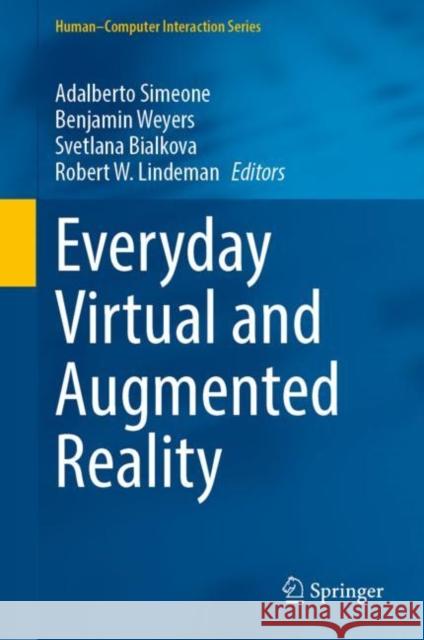Everyday Virtual and Augmented Reality » książka
Everyday Virtual and Augmented Reality
ISBN-13: 9783031058035 / Angielski / Twarda / 2023 / 268 str.
Everyday Virtual and Augmented Reality
ISBN-13: 9783031058035 / Angielski / Twarda / 2023 / 268 str.
(netto: 690,08 VAT: 5%)
Najniższa cena z 30 dni: 655,41
ok. 16-18 dni roboczych.
Darmowa dostawa!
This edited book introduces readers to the area of “Everyday Virtual and Augmented Reality”. With Virtual and Augmented Reality technologies, becoming more pervasive in our homes and workplaces, new use cases and scenarios emerge together with new challenges that need to be addressed. These challenges encompass the design and implementation of appropriate VR/AR applications for ordinary environments that were not built with the explicit intention of supporting VR systems. The everyday/domestic environments present a range of issues that are usually not present in the physical locations purposed for VR and AR use in academic or professional environments, such as constrained spaces, presence of obstacles, absence of instrumentation, social and organizational restrictions etc.To address the above challenges, we collect the latest work from the Virtual Reality and Augmented Reality research community, by combining the presentation of general definitions and characterization of the field, of interaction concepts and techniques, of a variety of use cases and areas. The constellation of different environment examples (from education, sport to consumer and marketing), from across the globe and platforms, provide a comprehensive discussion on scientific and engineering methods, which enable the development of VR/AR systems in everyday context.
This edited book introduces readers to the area of “Everyday Virtual and Augmented Reality”. With Virtual and Augmented Reality technologies, becoming more pervasive in our homes and workplaces, new use cases and scenarios emerge together with new challenges that need to be addressed. These challenges encompass the design and implementation of appropriate VR/AR applications for ordinary environments that were not built with the explicit intention of supporting VR systems. The everyday/domestic environments present a range of issues that are usually not present in the physical locations purposed for VR and AR use in academic or professional environments, such as constrained spaces, presence of obstacles, absence of instrumentation, social and organizational restrictions etc.To address the above challenges, we collect the latest work from the Virtual Reality and Augmented Reality research community, by combining the presentation of general definitions and characterization of the field, of interaction concepts and techniques, of a variety of use cases and areas. The constellation of different environment examples (from education, sport to consumer and marketing), from across the globe and platforms, provide a comprehensive discussion on scientific and engineering methods, which enable the development of VR/AR systems in everyday context.











